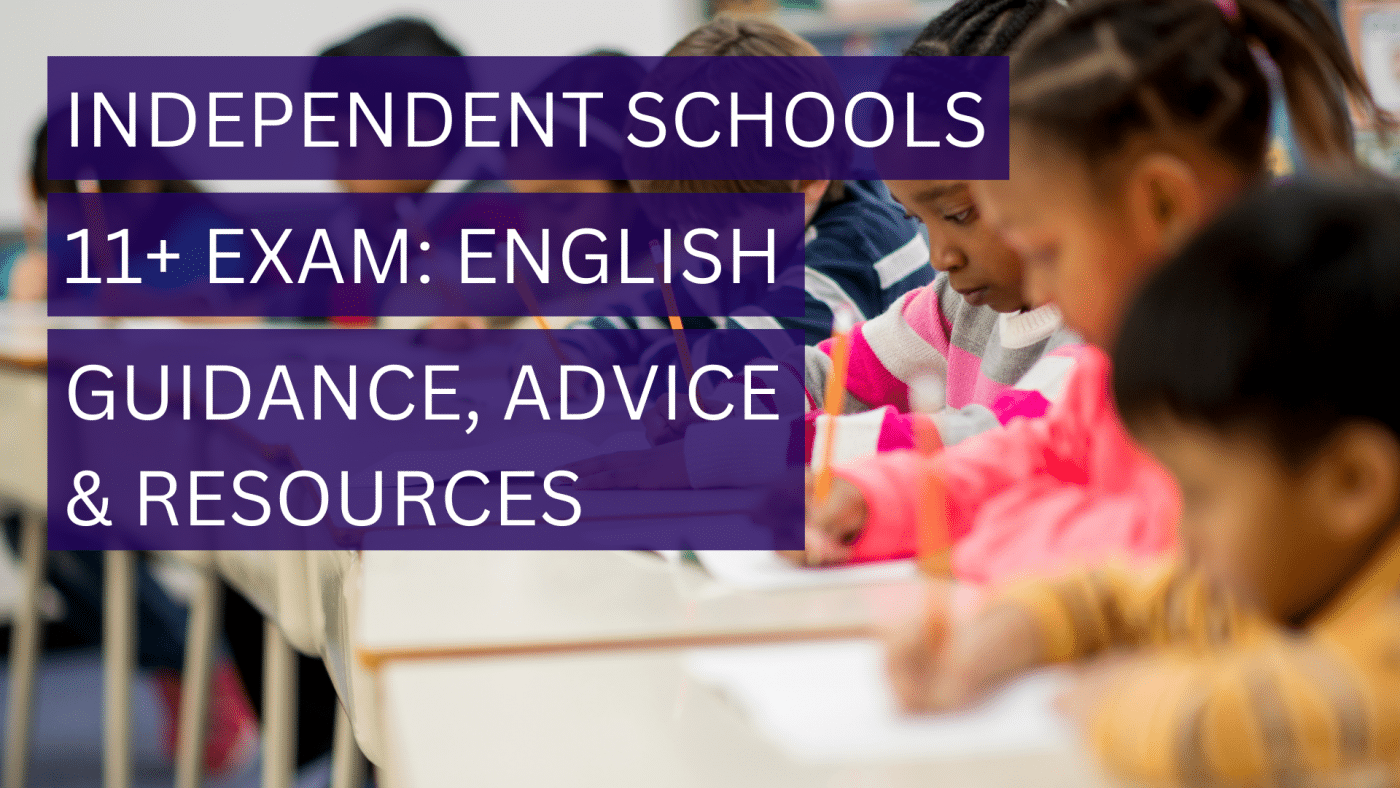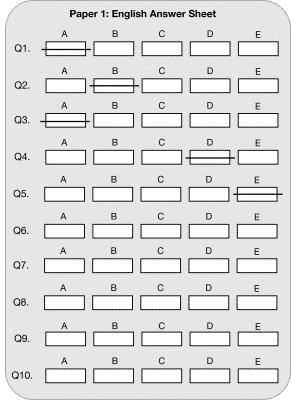The 11+ Independent School English test comprises of two main parts: Comprehension and Creative Writing. However, some schools may also include additional questions focused on Grammar and Vocabulary, such as the below. Each component tests different aspects of a student’s language abilities, so a well-rounded approach to preparation is essential.
- Correcting sentences;
- Grammar, spelling, and punctuation;
- Reading and comprehension;
- Missing words;
- Finding the right words;
- Adjectives, nouns, and verbs.
What is assessed during the 11+ Kent Test English paper?
The 11+ English exam tests a candidates comprehension abilities and literacy skills.
Sample 11+ English comprehension question
Freddie looked up from peering through one of the glass cabinets, hoping to find the perfect item of jewellery for his best friend, Scarlett. He was in a small jewellery shop in the city centre of CapeTown. The walls were painted in a dark red, with pictures hung crookedly all around. The floor was tiled and scuffed. The faint lighting made it difficult to see what you were looking at, but somehow it made it feel cosier, more inviting.
Freddie stood in the farthest corner away from the tills, but the sound of the trembling young girl grabbed his attention. No older than 20, the young girl paced around the shop with her phone fixed to her ear, trying to report the incident. As customers stopped in their tracks to ogle the spectacle, the shop was beginning to overflow with curiosity and interest.
Based on the text, how old do you think the girl is?
a) Seventeen
b) Twenty seven
c) Four
d) Thirty three
a) Seventeen
Paragraph 2 states that the young girl is ‘no older than 20’ so she is not twenty seven or thirty three. We are also told that she ‘paced around the shop with her phone fixed to her ear, trying to report the incident’ so it would be unreasonable to assume she is four.
Sample 11+ English literacy question
What is the adverb in this sentence?
Kate ran hurriedly in order to get to her lesson on-time.
Hurriedly
An adverb is a word which describes a verb, adjective, or another adverb.
How to answer the 11+ Kent Test English paper
During the exam candidates will be provided with two booklets. One booklet will be the testing booklet which will include all the questions. The other booklet is the answer booklet and should be filled out in relation to the testing questions. Students need to check that they have been given the correct testing and answer booklets, and that the booklets match the paper that you are expected to sit. During the test, to mark the correct answer in the answer booklet, students must draw a line through the small rectangular box, indicating their chosen answer.
Like so:
Remember, student’s answers must show correlation with the number of the correct question. You will not receive a mark for the question if your answer number doesn’t match the question number.
Top tips for the 11+ Kent Test English exam
- The 11+ exam is designed specifically to test what you learned in your Key Stage 2 English lessons. Therefore, it is important to brush up on all the key skills you have been working on at school, as well as trying your hand at some example practice question.
- If you don’t read already, try doing some reading in your spare time. Try a book from your school or local library, and read a little before bed each night or after school. This will help you greatly with the comprehension part of the exam.
- It is crucial that you understand what each question is asking before you start to answer it. Re-read a question if you are unsure.
- Make sure you allocate your time in the exam wisely. Whilst it is important to make sure you understand and spend enough time on each question to get the best marks, you don’t want to end up rushing any questions at the end of the paper.
- If you get really stuck on a question, don’t spend too long thinking about it. Instead, move on to answering the rest of the paper to the best of your abilities, and leave some time at the end to come back and re-visit any questions that you were unsure about the first time around.
- Make sure you practise all of the different types of questions before the exam. If there are certain types of questions you find harder to answer, or topics you struggle with, spend a little more time practising them.
Revision tips for parents
- Support and encouragement from parents can go a long way. Encouraging your child to do even a small amount of practice outside of school can really improve their performance.
- Do not overload your child with stacks of work. This will only make them feel overwhelmed and discourage them. As with many things, it is best to break up their revision sessions into small, manageable chunks. This will ensure that their concentration levels remain high, and that they are able to take in the information that is being covered.
- Make sure you schedule in plenty of rest breaks for your child. Allow them to go outside or participate in an activity that they enjoy doing. This boosts their energy and prepares them for the next time they sit down to study.
- Reward their progress and achievements. This doesn’t have to mean anything extravagant, but when they have done well, or mastered a certain type of question that they had been struggling with, a small reward will make it all feel worthwhile.
- Have key notes or definitions placed around your home or your child’s bedroom. This will refresh the memory subliminally and help small portions of information to sink in. Visual aids are a great way to stimulate a child’s brain.
- Encourage your child not to feel embarrassed about discussing topics that they don’t understand, so that they are able to talk through them.
- Plan to focus on a specific topic in each ‘session’. This will ensure that revision is not too overwhelming. Begin with a topic that they find the most challenging, and interchange this with a topic that they are confident on – this will keep their confidence at a stable level.
- Encourage note-taking and bullet-point making. If your child is simply reading through questions and working them out in their head, they are less likely to retain key information.
- Make sure your child has an environment to study in which is as distraction-free as possible. Ideally, you should choose somewhere not too noisy or cluttered. This will also mean that they will get more done, as they can avoid potential interruptions.
- Similarly, when your child has set aside some time to revise, make sure that the television is off, there are no phones available, and the focus is purely on the subject at hand. This means that once it is time for a break, these things will serve as a reward for them in their free time.
- Once your child has become confident with a certain type of question, try encouraging them to practise under timed conditions. They do not necessarily have to do a whole past paper in one sitting, but even just one timed section will help to simulate the feel of the actual exam day.
- Gradually build up to longer sessions. If your child is having trouble concentrating, start with short twenty-minute sessions and aim to build them up over the course of their exam preparation. This makes a lot more sense than sitting your child down for an hour or two and expecting them to stay concentrated from the outset.
- It may sound obvious, but make sure your child is getting enough sleep. If you haven’t already, try and establish a solid routine. This will mean that they are able to concentrate and retain more information.
- It is especially important to try and ensure that your child gets adequate sleep the night before the exam. Try not to make them feel too stressed or pressured in the evening, and reassure them that you are confident in their abilities. This will alleviate some of the worrying that can occur in the days leading up to the exam.
- Let your child know that you are proud of them – whatever the outcome. They do not need the added pressure of worrying about potential failure. The best thing you can do is to encourage them.
- Getting the right nutrition is also essential for everything from concentration, to sleep, to mood. Ensure that your child is eating healthily and has a well-balanced diet. Consuming too much sugar or high-fat foods will make your child’s energy levels peak and then crash, thus negatively affecting their performance.
- Similarly, make sure your child is getting plenty of fresh air and exercise. They should be spending a small amount of time outside each day. This will also keep their concentration levels high and help them to get a refreshing sleep every night.
- Try not to leave revision to the last minute. This will only make your child feel unnecessarily stressed and anxious. If you start introducing small, manageable bites of revision a good amount of time before the exam, it will make for a much more productive outcome in the long run.
Independent School 11 Plus Online Practice Course
- Get INSTANT LIFETIME ACCESS to use on any device, at any time;
- BECOME 100% PREPARED for any independent school 11+;
- FAST-TRACK your child’s progress and boost their scores rapidly;
- GET INSTANT ACCESS to the course so your child can practice today;
- 100S OF SAMPLE eleven plus test questions;
- ANSWERS AND EXPLANATIONS to all the questions.
Don’t forget, we have an excellent YouTube channel with videos covering all aspects of how to prepare for the 11+ Independent School Test.


